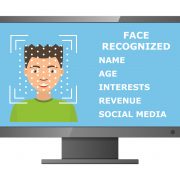The Netflix series Black Mirror has struck a nerve with its viewers. Set in the not-so-distant future, Black Mirror uses chilling stories to demonstrate the integral role technology plays in our lives. From using hashtags on social media to signal drone bees to murder, to algorithms dictating our dating lives, the show makes watchers uncomfortable with plots that seem all too plausible.
But of all the episodes that seem like they may come to fruition in the near future, Nosedive takes the cake.
Social Media
Imagine if your role in your community, and society as a whole, was determined by your social media clout. This is exactly what the characters in Nosedive have to deal with. In this episode, the fictional future has combined social media with yelp and used it to give each individual a score. But this score is not simply about knowing who is the most popular or who shares the most interesting posts.
Instead, this score controls every aspect of your life from who you communicate with to which companies will provide services to you. The second you meet someone, you see their score and they see yours. And since, in this reality, there is some sort of retinal device that makes all this possible, you don’t even have to glance down at a phone. Each encounter with a new person results in their social score being displayed literally in front of your very eyes.
But when the main character of this episode, who is obsessed with raising her social score, begins to have several subsequent negative encounters, her score plummets. Suddenly, she is unable to book a flight, as the airline will not accept someone with a low score. She is also barred from entering certain events. This score begins to completely control her life.
As fictional as this plot may seem, this type of scoring apparatus is already happening in America, to some degree. Everytime you get into an Uber your driver gives you a score and you give your driver a score. This ranking determines which drivers will agree to give you a ride in the future. But it also works the other way, passengers with high scores will almost never be assigned drivers with low scores.
But all this is done on a private, voluntary level. There is no government or central authority in control telling you who you can associate with, at least not yet. But what happens when shows like Black Mirror are used more as a guide, than a spooky warning? We need only look to China to find out.
Stranger than Fiction
Recently, China announced its plan to move towards its own social credit ranking system. In a document titled, “Planning Outline for the Construction of a Social Credit System” it outlined a new structure for ranking social trust. But there is a major problem with this. Unlike Uber, which is private, this proposal is a government ranking, and one that could potentially control almost every aspect of its citizens’ lives.
To be sure, most of our behavior and our purchase histories are already monitored being monitored. That is the reality we have had to face in our modern age. But as of now, at least in America, this data has not been fed to one central organization for the sole purposes of scoring each American.
But if China’s plan becomes a reality, each point of data will be given a positive or negative score. Once these various points are all combined, it will rate a person’s “trustworthiness.” But this wouldn’t just be used to tell other people to steer clear of fraternizing with you. Instead, it would determine your ability to buy a home, obtain a job, and even where you are able to send your children to school and who you can date.
This “citizen score,” as it is called would essentially act like a credit score on steroids, limiting your ability to make choices for yourself. This plan is already well on its way to building this social credit system to rate China’s 1.3 billion citizens. Its aim, as stated in the document is as follows:
“It will forge a public opinion environment where keeping trust is glorious. It will strengthen sincerity in government affairs, commercial sincerity, social sincerity and the construction of judicial credibility.”
But this should be the task of individuals, not that of governments. By giving the government the ability to rank and restrict its people from not only businesses but from relationships with other people, individualism is not allowed to flourish.
Summing up this project perfectly, Rogier Creemers, who studies Chinese law and governance at the Van Vollenhoven Institute at Leiden University, has called this plan:
“Yelp reviews with the nanny state watching over your shoulder.”
And while the happenings in China may seem entirely disconnected from those in the United States, it is dangerous to give any government this precedence. Once it can be done there, it can be done anywhere. So let us use Black Mirror as a warning, and not as a suggestion. For if we do not, our individualism is truly at stake.













